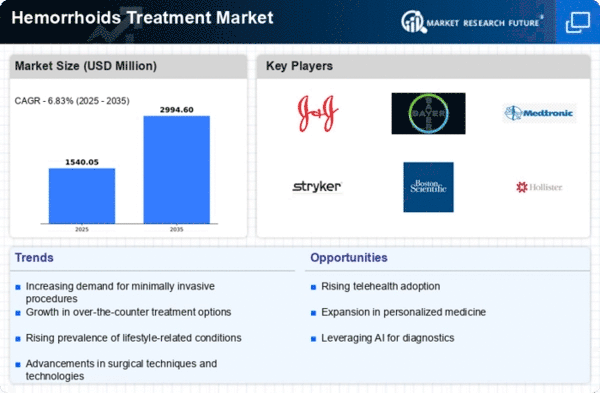Market Trends
Key Emerging Trends in the Hemorrhoids Treatment Market
One important trend in the hemorrhoids treatment market is the growing tendency toward safe or minimally intrusive treatment options. As compared to other conventional cautious mediations, treatments like infrared coagulation, sclerotherapy, and flexible band ligation are becoming more and more well-known because to their sufficiency, reduced discomfort, and shorter recovery times. Without a prescription haemorrhoid lotions, treatments, and suppositories are becoming more and more well-known. Consumers are increasingly seeking self-prescription options, and over-the-counter products provide a convenient and accessible means of reducing the discomfort and chills associated with hemorrhoids. Improvements in clinical hemorrhoid therapies are causing a shift in the market. Important level definitions that combine unique mixtures with traditional repairs are being investigated to increase survival and provide immediate assistance. This illustration shows ongoing efforts to address consistent outcomes and experiences in the realm of treating hemorrhoids. Combining telemedicine with in-person consultations related to hemorrhoids is a noteworthy procedure. Currently, individuals may get advice from medical professionals some distance away, removing barriers to clinical reasoning for a condition that is occasionally viewed as delicate or degrading and utilizing beneficial remedy. Clinical benefit specialists are increasingly highlighting the role that dietary and lifestyle modifications have in preventing and managing hemorrhoids. This strategy includes recommendations for increased intake of fiber, water, and regular exercise to improve stomach health and lower the risk of hemorrhoidal ejections. Combination therapies that address many aspects of hemorrhoids, such as promoting tissue healing, reducing discomfort, and minimizing adverse effects, are becoming more and more well-known. A combination of food modifications, lifestyle adjustments, and skin treatments may be used in these therapies to provide comprehensive protection against hemorrhoidal side effects. Severe hemorrhoid therapies are also emerging, with advances aimed at reducing obtrusion and concentrating on subtle outcomes. Techniques such as stapled hemorrhoidopexy and laser hemorrhoidectomy are gaining some traction because, in comparison to traditional hemorrhoidectomy, they can reduce pain and shorten recovery periods. Biodegradable options for hemorrhoid treatments are becoming increasingly popular, particularly in the realm of medical devices. Biodegradable materials have the benefit of having a more subdued natural impact and may provide additional benefits for the comfort and recovery of patients.









Leave a Comment